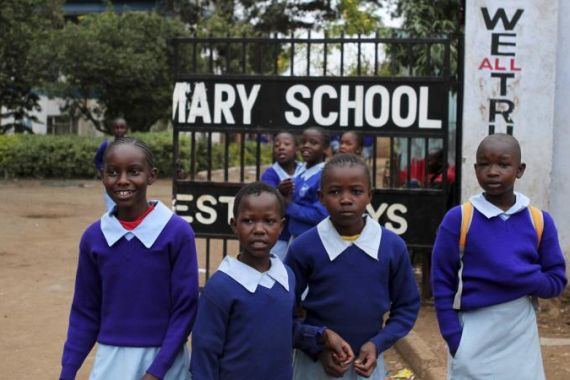Victory for Kenya’s teachers
After a three-week-long strike, teachers got a pay rise, but students have little time to catch up ahead of exams.

Teachers in public schools in Kenya have had a major victory, after three weeks of icy relations with the government. It took three weeks of coercion and intimidation. The government threatened to fire them, hire trainees and recall retirees, but now the teachers finally have their pay deal. It’s not what they had asked for and not nearly enough to cushion against hard economic times and inflation, but to them, it’s a start, a sign that they have been heard.
On the first day of the third and most crucial term in the school calendar, all the 260,000 teachers in public schools downed their tools.
Pupils waiting to sit their national exams – the most important of their lives – were especially troubled by the strike.
I first met 14-year-old Philip Okoth at the Olympic primary school in Kenya’s infamous Kibera slum. The strike had just started and he had been appointed teacher of class eight.
“We will do the best we can to revise on our own,” he told us. “Teachers are important but we can’t wait for them, our future is too important.”
When I returned to the school after the strike was called off, he was home. I traced him there. He was revising with his mother. She has little formal education and most of the subjects overwhelm her – but she wants to be there for her son.
“Philip is a bright boy but I know these three weeks will affect his performance and that of many others,” she said. “This is a short but very important term. This is the time the students need their teachers most. But the teachers are within their rights. They have families as well and need to be paid better”
Philip told us he is happy the teachers will be returning to class. He’s also worried though.
“Many students, especially in my school, are weak and rely heavily on teachers to guide them through revision,” he said. “Without proper guidance these students will fail. I’m more worried about them.”
There are about 10 million primary school pupils and about two million secondary school students preparing for the exams. They have no time to waste. Many schools have not even finished the syllabus and the exams start in October.
Another setback for the students is that they have to compete with their counterparts in private schools who were not affected by the strike. Private schools are already miles ahead.
The introduction of free primary education in 2002 saw enrolment to public schools more than triple. The government however did not improve the infrastructure by building more schools. It did not increase teachers. More than 40,000 teachers are needed to fill the gap.
Naturally because of all these inadequacies the education standards slipped and schools that were once thriving found themselves in the bottom of the pile.
The teachers we spoke to said the salary is just one of many grievances that must be addressed in the public school sector.
Failure to address other equally crucial issues might lead to a whole generation of students who have been to school, but lack an education.
From October, the lowest earning teacher will take home $231 a month up from $158 before tax. Kenya’s highest paid teachers will now be paid $1,600 – 300 more than they were previously earning. The salary will be back-dated to July. They will also get a 30 per cent hardship and special schools allowance.
With that the teachers union called off the strike with a handshake with the education minister and an assurance that no teacher will be victimised.
One question remains though: where will the money come from?
Finance Minister Njeru Githae said the government had not budgeted for the money.
“We saw this coming and set up four teams to explore revenue sources the government could use to raise additional money to pay teachers,” he said.
Some of the options are reducing the development budget, recurrent expenditure, local or international borrowing and if push comes to shove, taxing the already heavily burdened tax payer.